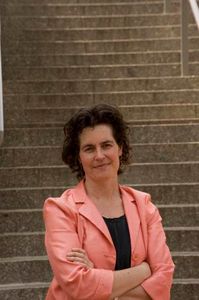New BU Research Center (BUSM, BUSPH and Sargent) Seeks Innovative Therapies, Products to Halt the Crippling Advance of Arthritis
Julie Keysor is a swing-dancing 44-year-old who also likes to hike, bike, snowshoe, sail, and fish. None of which would seem remarkable were it not for the fact that Keysor has arthritis, diagnosed when she was just 25.

That circumstance, and the fact that Keysor’s five-year-old daughter also suffers from a form of the disease, explains the Sargent College associate professor’s determination to improve the quality of life for the tens of millions of Americans combating the crippling malady. It also helps to explain Keysor’s delight at having just been given $4 million to battle the potentially crippling joint disease. The five-year grant from the National Institute on Disability and Rehabilitation Research will fund a new BU center, which she’ll direct, that will research ways of keeping arthritic people active and able to pursue their regular activities. The center will also include faculty from the Schools of Medicine and of Public Health and is expected to begin work this winter.
Sargent College Dean Gloria Waters says the research being made possible by the grant will enhance understanding about how factors like exercise and knee replacement surgery can affect arthritis. Four predoctoral fellows will be recruited to the center, a vital undertaking, says Waters, because “there is a severe shortage of doctoral trainees in the area of rehabilitation.”
Collaboration between MED and Sargent, she says, “should provide the students with an excellent background for carrying out rehabilitation research.”
Keysor’s own combat with arthritis began after a series of knee surgeries. “My knees basically aged 50 years in about 10 years,” she says. She’s among 46 million Americans with the disease, a number expected to climb to 67 million in three decades as the U.S. population ages . “There are very few effective interventions once they experience pain and functional limitations,” she says. “I think there’s a lot that we don’t know,” notwithstanding the development of some effective medications.
The public health consequences can be devastating, Keysor adds. “Many people become restricted in their ability to get around, which ultimately can lead to them becoming isolated in their homes.” According to the Centers for Disease Control and Prevention, arthritis and other rheumatic conditions cost the United States $127.8 billion in 2003, the most recent year for which statistics are available. More than a third of those costs resulted from lost earnings.
There are more than 100 types of arthritis. Keysor suffers from the most common, osteoarthritis, which results from aging, obesity, or joint-stressing athletics. Her daughter has psoriatic arthritis , a type that afflicts some people with psoriasis, although most children with the disease have juvenile rheumatoid arthritis.
The new center will research rehabilitative and behavioral strategies for coping with arthritis, focusing on three major studies. One will seek to help people with arthritis stay on the job. Another will research “physical activity adherence,” or ways to motivate people to stick with strength-training and aerobic exercises that can mitigate arthritis, but that people often give up, whether from pain or lack of commitment. People “may not know what type of exercises to do or how to perform the exercises safely without potentially damaging forces on the joints,” Keysor says.
Finally, an epidemiological project will measure how patients do after knee surgery. “We want to characterize the extent to which people are getting involved back in their daily life,” she says.
This work will fall to a core faculty of 10, culled from the three participating schools, plus an advisory committee drawn from across the University and from the Massachusetts chapter of the Arthritis Foundation . The foundation will work with the center to develop consumer products from the research and to sponsor informational forums, according to Keysor.
Keysor’s daughter enjoys soccer despite having been diagnosed when she was just a year old. Mercifully, she’s mostly pain-free, although she sometimes tells her mother, with a child’s endearing pronunciation, “Mommy, we need to go for a walk because it will make my arthur-itis go away.”
This BU Today story was written by Rich Barlow. He can be reached at barlowr@bu.edu.